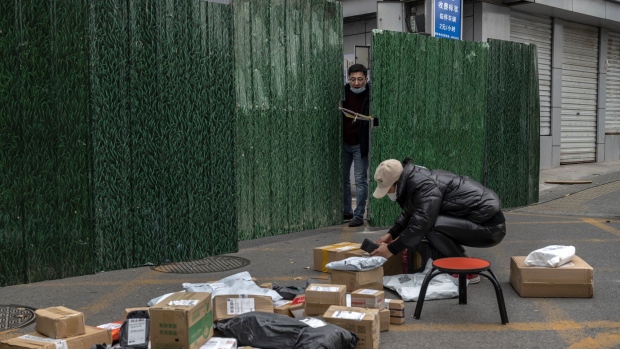Nov 24, 2022
Panic Buying in Beijing as Covid Surge Spurs Creeping Restrictions
, Bloomberg News

(Bloomberg) -- Beijing’s streets are deserted and grocery delivery services are running out of capacity as rising Covid cases trigger lockdown-like restrictions across swathes of the Chinese capital.
The city saw 1,854 new infections Thursday, up from 1,611 on Wednesday, as China’s wider outbreak reaches record levels.
While food was plentiful in many stores, delivery apps like Alibaba Group Holding Ltd.’s Freshippo -- known as Hema in Chinese -- and Walmart Inc.’s Sam’s Club were overwhelmed as residents hunkered down. Grocery outlets in Chaoyang, Beijing’s biggest district, no longer took delivery orders. Many restaurants halted even takeout services.
The surge, which has escalated from fewer than 100 infections a day a fortnight ago, is leading to stepped-up controls in the city of 22 million. Almost every district is seeing targeted lockdowns, implemented piecemeal, often one apartment block after another, and residents have been asked not to leave Beijing unless necessary.
Yet the restrictions are being rolled out quietly as officials communicate through neighborhood committees and WeChat groups rather than with sweeping, formal orders.
The under-the-radar approach comes after a new 20-point virus playbook issued two weeks ago for containing Covid told Chinese officials to avoid city-wide lockdowns and mass testing exercises, among other shifts. Yet adhering to the changes laid out by the country’s top leaders has proven difficult amid surging cases and more contagious variants.
The capital appears to be turning into a ghost town. Streets were deserted in what were normally some of the busiest areas, even during rush hour. Subway ridership plunged more than 64% for the week through Wednesday, compared to the same period in 2019, according to a Bloomberg analysis of transit data.
Schools have been closed in a number of Beijing districts, with students told to return to online learning. Most public venues including cinemas and shopping malls are shuttered, while some public parks are open at 50% capacity.
Some officials appear to be deploying more excessive moves typical of China’s previous Covid Zero approach. Some of them appear to be designed to discourage movement without resorting to an official lockdown.
Residents in the Fangshan district, southwest Beijing, were told multiple PCR tests would be required to commute across districts. If a person travels outside of Fangshan to go to work, for example, they would need to undertake three tests over three days on their return, according to a notice shared with residents of one housing compound seen by Bloomberg News.
Some residents in the city’s southern Daxing district must show a letter from their employers and sign a note pledging to go only to their offices if they want to return to work. They must sign another letter if they want to go to the grocery store.
All travelers coming into Beijing from elsewhere in China are already required to provide a negative PCR test result taken in the previous 48 hours before they can enter public venues or ride on buses.
Some apartment blocks are being locked down even when no infections have been detected. One woman’s request to travel out of the city for an important business meeting was denied by staff at her housing compound. She’s filed a complaint and appealed.
Another building shut down because an infection was found in someone who lived there. “Temporary control” measures were put in place, with no guidance given on how long they would last.
Beijing’s leaders appear to be girding for a further uptick in infections.
A new makeshift hospital with 200 beds opened in the suburban Yanqing district on Thursday, raising concern that existing facilities may have run out of room. Complaints about disarray and mess within these sites -- used to isolate Covid cases and their close contacts -- have been shared widely on social media, with people posting photos of dirty toilets and cramped rooms and complain about chaotic management.
Other cities have openly reverted to the old playbook as cases spread within their communities.
Localized shutdowns in Chongqing, a strategically important city in China’s southwest, mean the metropolis is largely locked down, despite no sweeping order or directive. Zhengzhou, home to the world’s largest iPhone factory, effectively shut down on Friday for five days. Shijiazhuang, a city close to Beijing that eased a raft of testing in the wake of the new directives, quickly backtracked.
Local officials are struggling to reconcile twin imperatives of being less disruptive while also suppressing the virus, in line with China’s Covid Zero policy. While health officials and state media continue to stress adherence to “dynamic zero,” getting outbreaks under control without using the usual toolkit, as cold weather descends and more contagious virus variants circulate, has proven challenging.
China’s Exit From Covid Zero Seen Stretching Beyond 2023
--With assistance from Gao Yuan and Yanan Fan.
(Updates with more on excessive restrictions from ninth paragraph.)
©2022 Bloomberg L.P.


